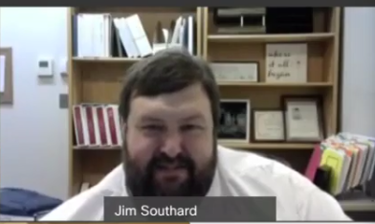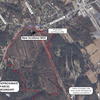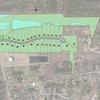New VCSD finance chief’s goal: ‘Leave it a little better than you found it’
NEW SCOTLAND — Voorheesville’s new assistant superintendent for finance and operations really has only one thing he wants to achieve during his time in the district.
“I think the goal whenever you go to a district is to try to make sure you leave it a little better than you found it. And that’s pretty much it,” said James Southard. “I mean, it’s making sure we have the systems in place to accomplish everything. We need to make sure we’re watching every penny, because it’s the taxpayers’ money.”
Before coming to Voorheesville, Southard worked for 13 years in the 333-student DeRuyter Central School District in Madison County, some 33 miles southeast of Syracuse.
Before DeRuyter, Southard spent four years in the public sector in the Syracuse City School District, where he started in 2004.
He graduated from Skidmore, the Saratoga Springs liberal arts college, in 1994 after which he worked for a tax software company for five years before starting with the Syracuse schools.
“Wherever we could do a calculation on a tax form,” he said. “We did it.”
Budget
Voorheesville is still facing a $426,00, or about 1.6 percent, budget shortfall on next year’s $26.6 million spending plan. The gap must be filled with new state aid, expense reductions, reserves, or fund balances, Southard told school board members at their March 8 meeting.
But Voorheesville received some good news recently when it was announced the district would receive $334,000 as part of the $1.9 trillion American Rescue Plan.
The $334,000 was by far the lowest dollar amount of federal aid of any school district in Albany County (Green Island is next at $749,000), and among the lowest in the eight-county Capital Region. But Superintendent Frank Macri noted this week that the money is earmarked for rural and high-poverty needs schools.
Voorheesville, with 9-percent poverty in the district, doesn’t fit the criteria.
On a per-pupil basis, Voorheesville received approximately $284.25 per student from the Rescue Plan. Its up-the-hill neighbor, Berne-Knox-Westerlo, took in about $1,311 per student.
The money can be used over a three-year period, Macri said.
One reason Voorheesville wouldn’t want use the federal funds to plug its budget $426,000 gap this year, Macri told The Enterprise, is “because there’s going to be a bigger budget gap in the next two to three years when that federal money stops, and you want to save that money for when you have that bigger cliff coming.”
He continued, “Because this year is going to be great. Two years from now, I’m anticipating you’ll see a bigger cliff ... I think you’ll see a bigger cliff in three years when the federal money runs out.”
Taxes
The tax levy makes up 72.5 percent of the district’s projected budget. While state aid makes up nearly 19 percent of the projected budget based on the governor’s executive budget.
The tax-levy limit for 2021-22, which is set by the state, will be approximately $19.26 million, an allowable increase from this year of $510,968, or 2.72 percent.
The school district has one of the highest growth rates in the Capital Region, so the increase will be spread around, Macri said during the March 8 school board meeting.
Between 2017 and 2020, the total number of parcels on the New Scotland assessment rolls paying taxes to the Voorheesville Central School District increased by 67.
The new homes don’t mean lower taxes; they just help to distribute the new load.
For example, next year’s property tax levy will be about $19.26 million, and the maximum that the district can raise property taxes for next year is about 2.72 percent, generating an additional $510,968 in revenue for the school district.
So, if an established New Scotland homeowner had an annual school tax bill of $2,000 and the 67 new homes came on the tax rolls, that homeowner would still be on the hook for the $2,000 school-tax bill, but now that $510,968 in new revenue would be divided among 167 hypothetical homes instead of 100.
Increases
The largest increases in the budget are in:
— Mechanical maintenance of on-site plant, $584,629, a year-over-year increase of about 34 percent;
— Teaching, $7,940,512, a year-over-year increase of about 4.6 percent, or $347,002;
— Programs for students with disabilities $2,820,086, a year-over-year increase of about 7.8 percent, or $204,234;
— Transportation, $1,068,500, a year-over-year increase of about 10 percent, or $97,982; and
— Retirement, both state, $983,144, and teachers, $984,935, year-over-year increases of about 8.6 percent and 5.25 percent, respectively.
But debt service payments are due to drop by 56 percent from $1,499,994 to $655,523.
The staff added to this year’s rollover budget include an operations and maintenance supervisor, a teaching assistant at the elementary school, a special-education teacher at the high school, and a part-time Spanish teacher at the high school.
The work of the operations and maintenance supervisor is being shared between Macri and Southard until the district gets a person in the position, according to Southard. The transportation supervision is through the Board of Cooperative Educational Services and will not be combined with operations — which it used to be when Mike Goyer was director of transportation and of facilities.
Elections
The deadline for school board candidates to file petitions is April 19, while the last day for the board to adopt a proposed budget to send to voters for approval is April 26.
May 18 is the budget vote and school board election.
Voting will will take place in-person this year, but there will still be a vote-by-mail option — residents can request a ballot by calling the district office after April 20.
Board members Robert Samson and James Coffin are up for re-election on the seven-member board. The posts are unpaid and the terms are four years each.
The budget vote and school board election are set for May 18.



